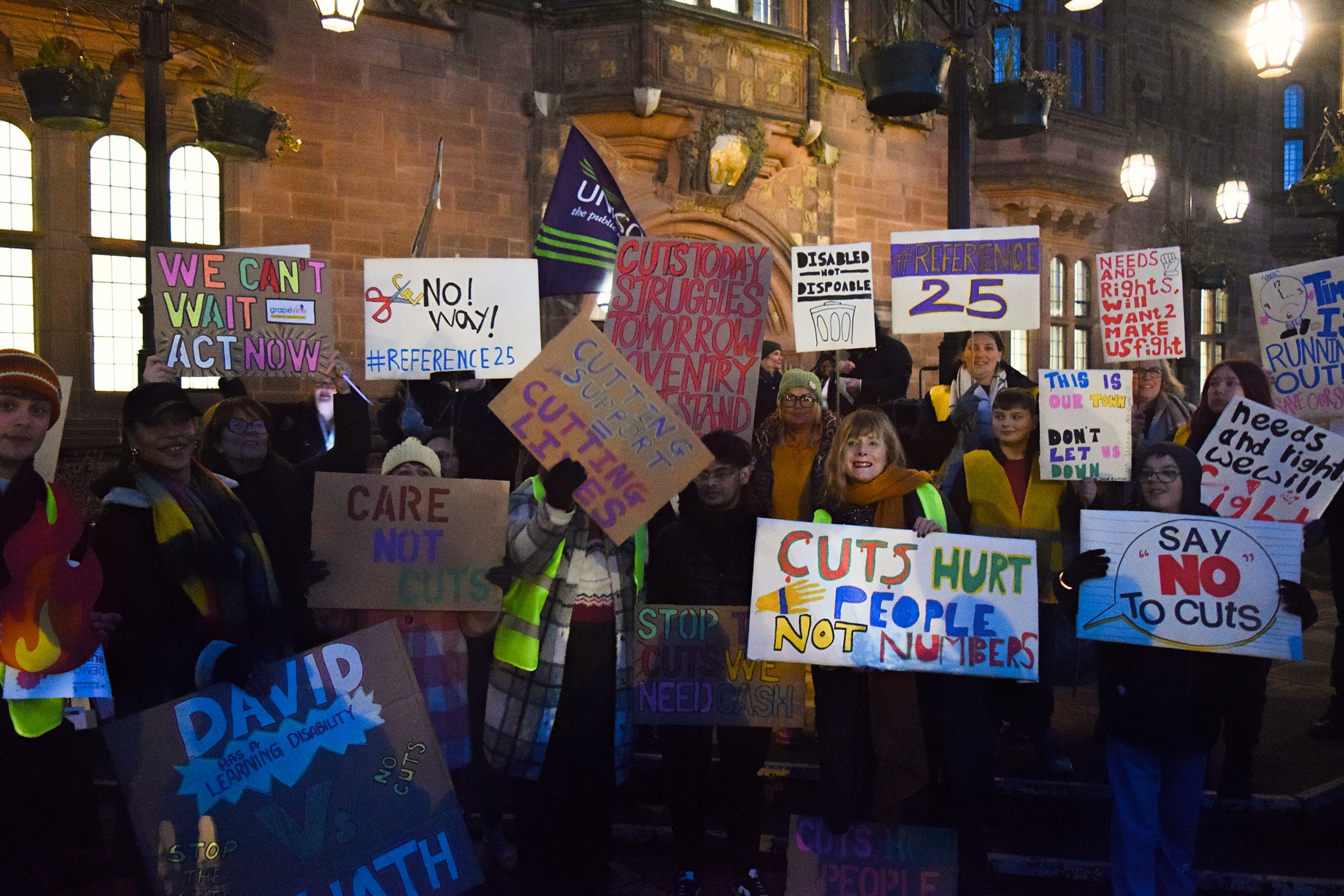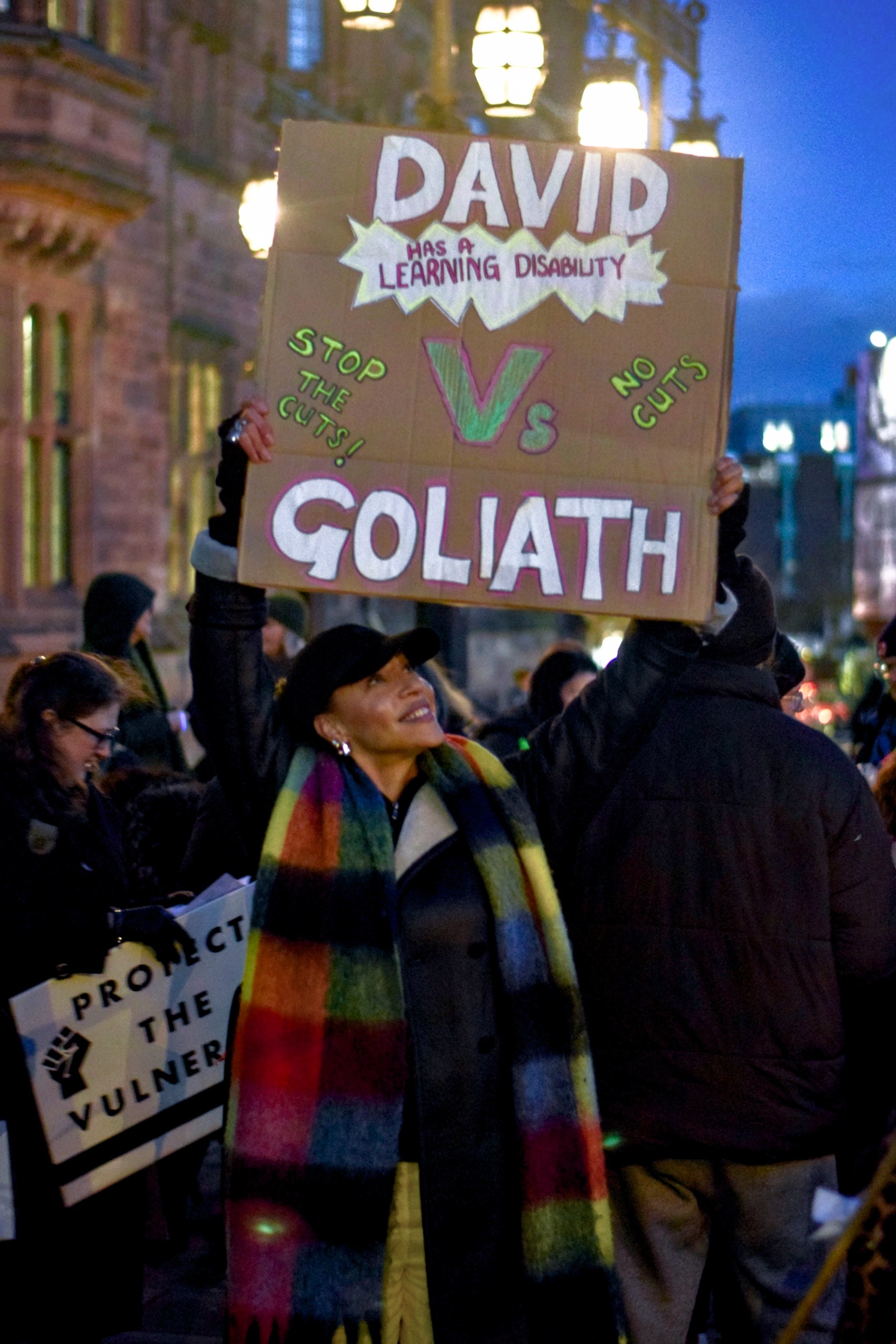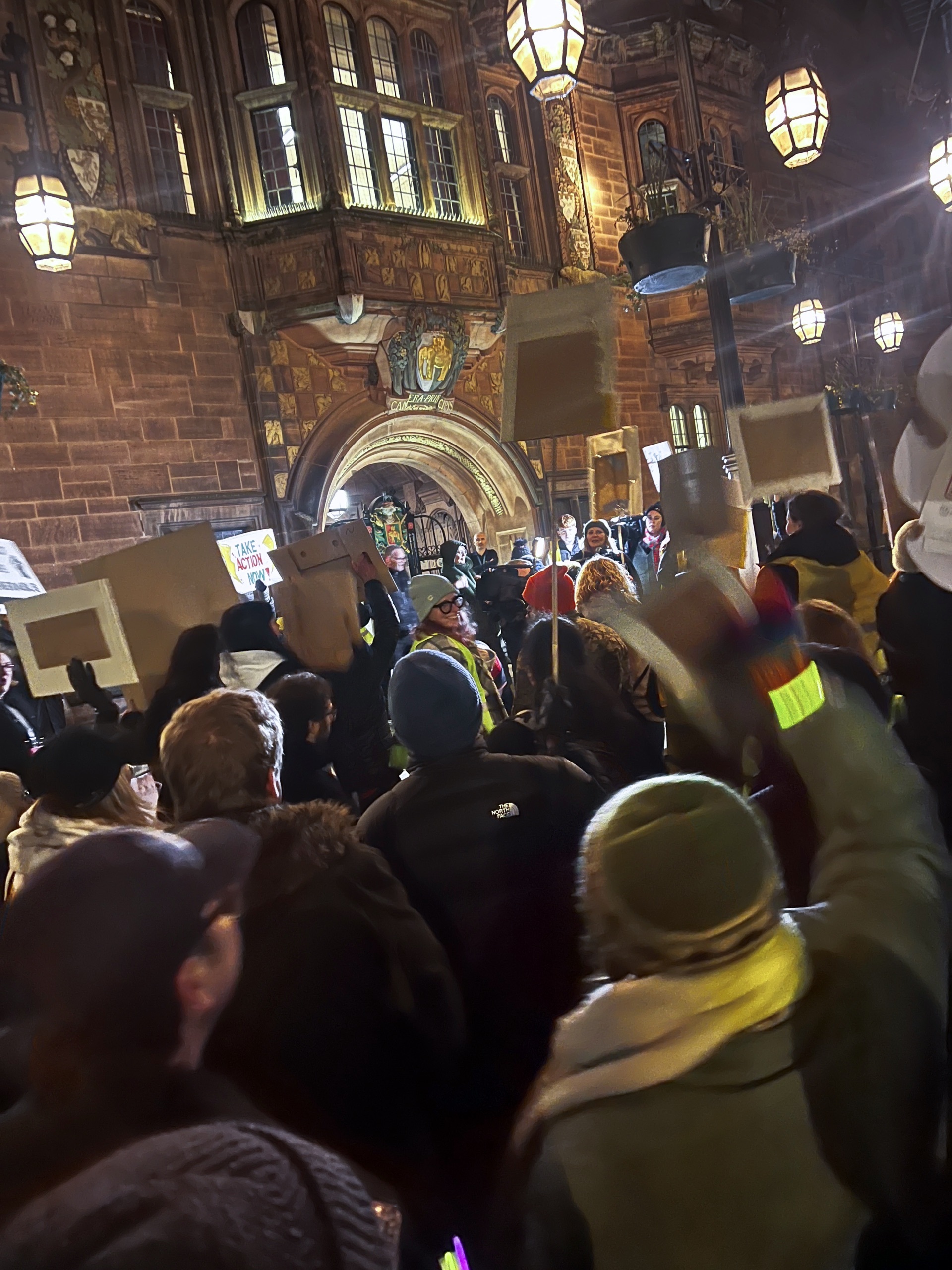Voices
This Is Our Town, Don’t Let Us Down – Community Power Against Cuts
How Grapevine successfully fought back against local budget cuts and what they learned in the process.
Jemima Elliott | 18 Sep 2025

What happens when you find out vital resources supporting your community could disappear in a matter of weeks? That’s exactly what happened to the staff at Grapevine Coventry and Warwickshire in December 2024.
Grapevine have supported communities in Coventry and Warwickshire for over 30 years. Initially supporting people with learning disabilities, they then broadened their work by building community power through organising. Grapevine have now become a vital organisation in their local area. Some of the funding then enables Grapevine to be such a valuable part of their community comes from Coventry City Council.
In mid-December 2024 Grapevine were called for a meeting with the Council, where they were told that their funding for the next financial year was being cut by 48 percent. This was part of a wider cut to third sector organisations across Coventry supporting disabled communities totalling 50 percent of the previous budget and affecting 12 local organisations. The Council’s budget funded Grapevine’s projects working with young people with learning disabilities who do not qualify for statutory social care support. The withdrawal of this funding would have had devastating effects on the people of Coventry, by removing the only support available to people already facing multiple crises, and consequently costing the local authority more in the long run through the intensified demand for statutory support.
Whilst the majority of the local voluntary sector accepted that these cuts were inevitable, Grapevine and their broad community base organised against the Council and won. The proposed cuts were abandoned, with full funding for 12 organisations continuing for another year. With only three weeks of action before the decision was finalised, how did Grapevine and their community succeed and what happens next?
We spoke with Clare Wightman and Mel Smith, CEO and Deputy CEO of Grapevine, to hear their story and the impact this campaign had on their community and their organising work.
How did you organise against these cuts?
Clare (CEO, Grapevine): This was such a short and intense campaign. We normally hear about any local budget changes in October but this time they announced the plans in the middle of December. The consultation ended on 28th January. The Christmas and New Year break meant that we had just over three weeks to lobby the council to stop the cut.
Mel (Deputy CEO, Grapevine): Our entire team, even those who weren’t normally organisers, shifted to work on this campaign. It brought us all together, across all the different projects we run. It was such a team effort. It’s hard to believe it’s been six months - I still feel like I’m recovering. These funds are vital to the communities we serve, and it felt like in an instant these resources would be taken away.
Clare: Because so many people we needed to be in touch with were going to be away or un-contactable, it felt like we needed to get through the Christmas period in order to talk to people who were affected and get the campaign moving. We needed a strategy, we needed a narrative, we needed targets, we needed to meet people. We were working through the holidays to get our base.
Stephanie (CEO, Act Build Change): I remember having a meeting with you about it on 23rd December!
Mel: Our strategy had two strands. The first strand was led by Clare, understanding the processes of the local authority and lobbying those in positional power. I led the second strand, where we organised grassroots action, supported those most affected by the cut to have their voices heard and raise public awareness of what was happening.
We knew that we wanted to mobilise as many people with learning disabilities, their families and allies as possible to show up for the public consultation and any kind of protest action we were going to take. We were looking for broad support across the community.
We were mobilising a strong and committed base we had already organised and built through our support programmes, previous campaigns and local partnership work. These relationships were vital to our success.
Clare: Once we found out, our organising team met in a hotel lobby to discuss what we were going to do. We created a campaign chart with a timeline of our actions and the council’s processes, who we were going to mobilise and how, and what our overall narrative would be.
Mel: We decided on four asks that we would give to the public: attend an online briefing on 8th January where we shared what was happening, to complete the online consultation, turn up to a protest if/when we called one, and to turn up to one or both of the consultation meetings that were called by the council. We had 120 people on our initial mailing list and ended up having over 150 people protesting outside the council house.
Clare: We needed to have an effective narrative that would have the most impact with the public and the decision makers. It needs to portray our work, what the proposed cut was and the impact it would have in a way that was easy to understand. I took responsibility for that.
We were using the narrative really early on – sharing stories of the issues and situations the people were facing and what it would mean to them and their wellbeing to have it removed.
Under pressure you tend to lean more on narratives of vulnerabilities in a way you wouldn’t normally. It’s not our usual practice to stress someone’s vulnerability, but in order to highlight the urgency and wrongness of the decision, I think we lent into that much more than maybe we ought to have done or were comfortable with. But we knew that it would work. We knew that the media would go for it and that politicians would go for it. The media were using language that we don’t use so it felt odd leaning into that. I don’t think any other framing would have worked though. We also needed to show that ultimately the cuts would cost the local authority more than it would have done to fund organisations like ours.
Stephanie: I think what Grapevine does really well is centre people’s power and agency. You can see this in the stories that people shared on action day, the banners, the collective commitment. This didn’t feel a desperate moment of vulnerability, it was a moment of powerful solidarity led by those whose lives were at stake if the cuts went through. So it’s not either/or (vulnerability vs agency), it’s both/and. Nothing can ever be perfect but these reflections on how the media and politicians demand dehumanising narratives in order to get to the negotiating table are significant. The role citizens and organisers play in that is an important reflection.

How did the council justify the cuts?
Mel: The local Head of Social Care said that the grants were unnecessary because these people don’t qualify for statutory support, so therefore have low-level needs, and we needed to counter that. We needed to emphasise that the people we support aren’t low-need but that the threshold for state support is too high and that removing the support we provide would plunge people into crisis. We work with people who are experiencing exploitation, hate crime, domestic abuse, historic sexual assault, revenge porn, addiction, social anxiety and mental health crises. These aren’t things that can be managed alone. We knew when they said the grants were unnecessary that we needed to show our worst cases where a crisis has hit. Personal stories make an impact, they’re what people can relate to, stories that they recognise within their communities and show what could happen if the funding was removed.
Clare: This was all happening within a few days. In every way we could, we worked to uplift the voices of those who were going to be most affected by the proposed cuts. It’s so important their agency and power was felt.
Mel: We held a public meeting on the 8th of January which was attended by 120 people and later mentioned during an interview on the local radio. We launched a petition which allowed our local councillor to speak and ask questions on the issue and show the broad support our campaign had, and attended public scrutiny meetings. We ran sessions where we would support people to complete the council’s public consultation form. We then held a protest outside the Council Hall during the last meeting where the cuts were being discussed. It was so joyful! There was dancing, brilliant slogans written on placards made during sessions supported by local unions, and an open mic where the people most affected by the cuts spoke. For many of them it was the first time they’d spoken in front of a crowd of people before, but they did so well and spoke from the heart. It’s hard to speak through a megaphone for the first time, it takes a lot of bravery. But we all were supporting them, it didn’t matter if they stumbled over their words or didn’t say something perfectly because we were all there to hold them in that moment.
Clare: We were also supported by the Law Centre throughout. If we didn’t prevent the cut we made plans to launch a legal challenge on the grounds that the cuts were unlawful and the consultation process inaccessible. Luckily, we didn’t need to do this but we’re still in contact with them.
How did this differ from past experiences?
Clare: This has happened to us twice before, but this time felt much bigger and much harder to prevent. The other times our council funding had been threatened were pre-2010, pre-austerity and a very different political landscape than now. Less money was at risk and it was more easily defended. This time felt like a much bigger challenge than previously.
Mel: We certainly had to call on more people this time. We hadn’t done so much cross-organisation organising work before, although we had built up strong relationships within our community. It certainly brought us as an organising team and our community together. It was the first time many of us had been involved in such a momentous win and proved that we could succeed together. It certainly built up the confidence and the leadership skills of many local people who were involved.
Clare: It is frustrating in many ways because we’ve had such limited capacity we haven’t been able to maintain that level of specific development in a way we’d like to. Our funding conditions often restrict us from working beyond the specific projects they have been designated for.
Mel: The campaign has had a legacy though. Coventry Youth Activists who worked on the campaign have been building their power and working together for disability rights locally and nationally. Another person who was involved in the campaign through one of our support programmes is now on our staff team.

What are the long term effects of this campaign?
Clare: It’s hard looking in the long-term for some of our projects. While the grant itself was saved for this financial year, the council is changing its funding system to be based on contracts instead of grants. This means that we’ll have to compete for the funding and decision making for who gets that funding could be based more on what is ‘the best value for money’ (i.e. the cheapest) rather than what is the highest quality or what’s best for the community.
The Integrated Care Board (ICB) will make the decision on where the funds go to. The councillors aren’t so close to the decision making there. The council’s democratic systems might be imperfect but they’re still present. Giving control to the ICB creates a significant democratic deficit, we don’t know what will happen. There’s little way for us to have a voice in what resources our community gets, and they may still get their cut. It won’t matter what the people using the service think of it.
Knowing what I know now, it would have been useful for us at the time to ask what was going to happen further down the line. To make an ask around that. What is the plan for the future? That’s what we should have done.
Mel: And it’s how we respond to it now. We’re on our knees as it is.
Did any of the other affected organisations join you in organising against them?
Mel: We were seen as outliers in the local voluntary sector for standing up against the cuts, for organising.
Clare: There was a complete silence from the voluntary sector. From speaking to other people, the feeling was that we had done something kind of immature, now doors would be closed and people wouldn’t speak to us and I just thought ‘you don’t understand power at all’. There’s a lot of acquiescence going on thinking that it will cost you access. It hasn’t cost us access at all.
Mel: Charities and third-sector organisations are so reluctant to stand up against budget cuts and injustice. It’s the norm to accept these conditions rather than challenging the power systems that create them.
Clare: It’s so evident in the fact that we were only ones at the public scrutiny meetings or organising against the cuts rather than accepting them as inevitable.
Decision-makers reinforce this individualism too. It would have been cheaper and easier for the council to tell all the affected organisations about the planned cut together in one meeting rather than calling us all in separately. That was tactical. They wanted to avoid facilitating any connection between us, or creating any shared sense of loss or solidarity. They wanted to isolate us.
Mel: I think so often grants like these are seen as a means for your organisation to survive and to keep your job rather than a social resource that is at risk of being dismantled. So many in the third sector need to remember who they’re serving or the original aim of their role. It’s not about you, it’s about the community. Even if we weren’t the recipients of the grant, we would organise to protect it because it’s so vital for the people of Coventry. We need to figure out how to get people in this sector to move beyond their fear of speaking out and start acting with courage and join us in building a wider base of people power.
What’s next?
Grapevine are exploring fundamental questions which will resonate with others focused on deeper, equitable and people-powered change-making. They welcome conversations, learning opportunities and all forms of engagement as they explore:
- Reducing inequity and polarisation: creating democratic space for the most disadvantaged, conditions for a communal space that has equity built in, and protecting the role of care as it expands.
- Collective infrastructure development: how to build, sustain, and embed an ecosystem of power, making it more than the sum of its parts.
- Rhythm and pacing of work: how to balance slower, deeper work for the right relationships and agency, with systemic, big change. And, how to create a structure that builds people’s democratic muscle through experience, then takes them to bigger issues.
Find out more about Grapevine’s organising work on their website, Instagram, Facebook, LinkedIn and Bluesky.